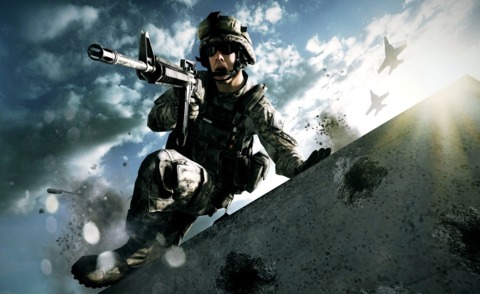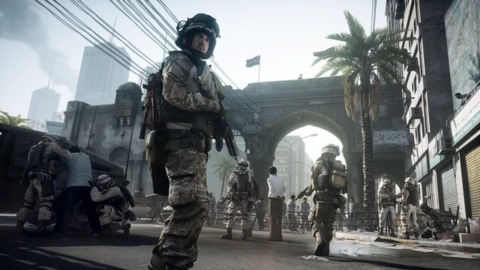Why Don't We Care About Censorship?
The banning of Battlefield 3 in Iran barely registered on the industry's radar because censorship in games is more common than we'd like to admit.
Last week, reports circulated that Electronic Arts' first-person shooter Battlefield 3 was banned in Iran. The reaction from gamers amounted to a disapproving shrug of the shoulders with a dash of, "Well, what did you expect from Iran?"
As understandable as that sentiment may be, it presupposes that things are fundamentally different elsewhere in the world. But I don't think they're quite as different as we might like to believe. In Iran, the government has decided that Battlefield 3's depiction of US soldiers engaged in a firefight at the Grand Bazaar is unacceptable and has cracked down on shops selling the game. Here in the US, we like to think that sort of censorship simply doesn't occur. While it's true that the government here doesn't outright ban games, we do have our own (potentially more insidious) limitation on creative expression in the form of the Entertainment Software Rating Board.

Established by the Entertainment Software Association but independently run, the ESRB doles out ratings for games, theoretically ranging from EC for Early Childhood to AO for Adults Only. That's only "theoretically" because the ESRB almost never hands down the AO for Adults Only rating. It isn't that the ESRB is looking the other way on deplorable content; it's that publishers go out of their way to avoid anything that could possibly draw that dreaded designation.
For all intents and purposes, an AO rating achieves the same thing as a ban. No major retailer will carry an AO game, and Nintendo, Sony, and Microsoft contractually forbid their publishing partners from releasing AO games on their systems. So if developers want to make a game in the AO category, they need to be prepared to sell it as a PC downloadable game from their own websites, the revenues of which might have a hard time covering the ESRB's ratings fees in the first place.
According to the ESRB website's database, 24 games have received an AO for Adults Only rating. Of those, only a handful are from legitimate publishers, with the most notable being a pair of Rockstar Games titles: Grand Theft Auto: San Andreas and Manhunt 2. But it's not like Rockstar was trying to blaze new trails in the realm of mature game narrative and wearing the AO designation like a badge of honor.
Grand Theft Auto: San Andreas originally went on sale with an M for Mature rating, but was re-rated AO after it was discovered to have remnants of an unfinished sex minigame hidden in the code, even though the game was inaccessible through normal play. After the rating, the game was pulled off shelves until an edited version could be resubmitted, restoring the game's M for Mature rating.
The AO-rated edition of Manhunt 2 was available for the PC exclusively at the Direct2Drive downloadable storefront for a time, but it is no longer on the storefront. In July, Rockstar said it was looking for other options to make the game available as a download; apparently, it found none.
If the creators of Grand Theft Auto can't make an AO-rated game viable in this market, then it's doubtful that anybody can. As a result, publishers and developers are essentially censoring themselves before the ESRB ever gets a peek at their work. They know an AO rating would kill their projects, so they don't even flirt with the idea, drawing unnecessary boundaries around their creativity. The irony is that the ESRB was established specifically to prevent censorship by showing the government that game makers aren't a bunch of amoral, smut peddlers who would gladly corrupt their kids for the lunch money in their pockets. Basically, the thinking was that if the industry could police itself, the government would have no need to do so.

I would say the ESRB is having a chilling effect on creative expression in the game industry, but that would suggest publishers want creative expression in the first place. EA's response to the Iranian ban is enough to see that isn't necessarily the case. As an EA representative told GameSpot, "In that Battlefield 3 is not available for purchase in Iran, we can only hope the ban will help prevent pirated copies reaching consumers there."
Notice how there's nothing in there about the ban being a wrong-headed abridgement of the basic human right of expression. Or anything about it being a negative thing at all. EA merely gives its quiet approval to the ban, hoping gamers who were never given the option to legitimately purchase Battlefield 3 will be prevented from pirating it. Rather than view this as the quashing of a creative work, EA's comment shows the publisher is viewing the ban as an irrelevant act, a commercial impediment to the game in a region where EA has no commercial interests.
So to recap, we have a system that effectively has game makers censoring themselves, but it's okay because the game makers don't seem to mind being censored, anyways. On a related topic, is it still unacceptable to end an editorial with an emoticon? Because if not, :(
Got a news tip or want to contact us directly? Email news@gamespot.com
Join the conversation